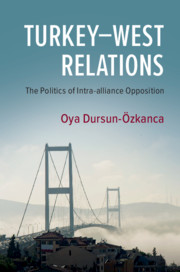Book contents
- Turkey–West Relations
- Turkey–West Relations
- Copyright page
- Epigraph
- Contents
- Figures and Tables
- Preface
- Acknowledgments
- Abbreviations
- Introduction
- 1 Framework of Intra-alliance Opposition
- 2 Turkish Foreign Policy in the Western Balkans
- 3 The Turkish Veto over the EU–NATO Security Exchange
- 4 The EU–Turkey Deal on Refugees
- 5 Turkey’s Energy Policies
- 6 Turkish Rapprochement with Russia in Security
- 7 Turkey’s Foreign Policy on Syria and Iraq
- Conclusion: Turkey and the West – What Next?
- Bibliography
- Index
7 - Turkey’s Foreign Policy on Syria and Iraq
Published online by Cambridge University Press: 15 November 2019
- Turkey–West Relations
- Turkey–West Relations
- Copyright page
- Epigraph
- Contents
- Figures and Tables
- Preface
- Acknowledgments
- Abbreviations
- Introduction
- 1 Framework of Intra-alliance Opposition
- 2 Turkish Foreign Policy in the Western Balkans
- 3 The Turkish Veto over the EU–NATO Security Exchange
- 4 The EU–Turkey Deal on Refugees
- 5 Turkey’s Energy Policies
- 6 Turkish Rapprochement with Russia in Security
- 7 Turkey’s Foreign Policy on Syria and Iraq
- Conclusion: Turkey and the West – What Next?
- Bibliography
- Index
Summary
This chapter provides an analysis of the implications of Turkish foreign policy on Syria and Iraq for Turkey–USA–NATO relations and argues that US support for the Syrian Kurds in the fight against the Islamic State (IS) caused a significant strain in USA–Turkey relations. It provides evidence for boundary-challenging behavior against the USA and NATO in light of Turkey’s long-lasting reluctance to join the fight against the IS, lax control of its border with Syria, and its denial of the Incirlik Air Base to US warplanes in the fight against the terrorist organization up until July 2015. It also makes a case for boundary-breaking behavior as a result of the use of compellent threats against US forces deployed in the Syrian Democratic Forces (SDF)-held areas in Syria, the Turkish military and diplomatic cooperative balancing with Russia leading to Turkey’s involvement in the Astana peace talks, and the Russian air support to Turkey’s ground operations in Syria. It concludes that Turkish foreign policy in the region increasingly shows tendencies for boundary breaking against the West through the use of more traditional tools of balancing.
Keywords
- Type
- Chapter
- Information
- Turkey–West RelationsThe Politics of Intra-alliance Opposition, pp. 126 - 146Publisher: Cambridge University PressPrint publication year: 2019

